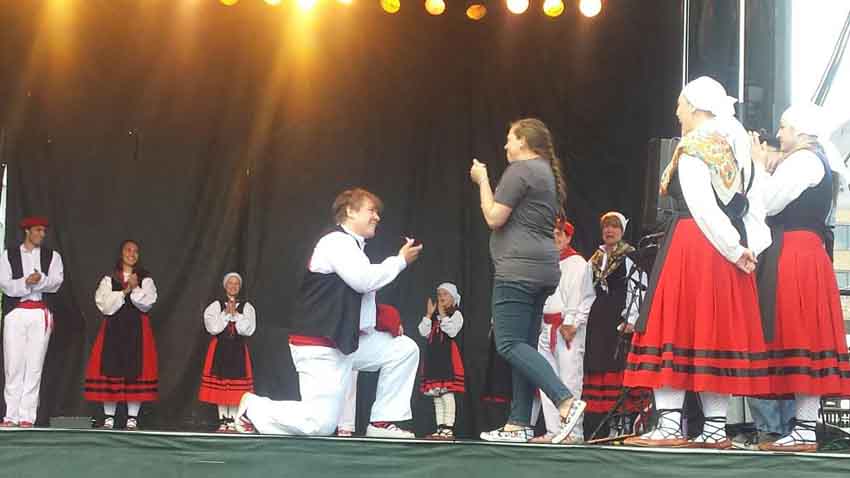Thirty-one year old, Cirbie Sangroniz, is an Basque-American, and director of the Utah-ko Triskalariak in Salt Lake A couple of weeks ago, she surprised her girlfriend, Amanda, by dancing an Aurresku to her on stage and then proposing to her.
basque heritage worldwide

06/09/2016

ADVERTISING
Thirty-one year old, Cirbie Sangroniz, is an Basque-American, and director of the Utah-ko Triskalariak in Salt Lake A couple of weeks ago, she surprised her girlfriend, Amanda, by dancing an Aurresku to her on stage and then proposing to her.
Joseba Etxarri. It was a surprise for almost everybody. Only the musicians and some of the dancers knew about it. Amanda, Cirbie’s girlfriend, was introduced to the Basque culture by Cirbie, and even though she isn’t Basque, she has accompanied Cirbie for the last year and a half, to all of her dance performances. Little did she know, what was waiting for her on May 22 when after one of the dance numbers, some dancers escorted her on stage at the Living Traditions Festival in Salt Lake City. In street dress and surrounded by dancers, she saw that the txistulari and accordionist started to play Aurresku and that Cirbie, nervous, dance in front of her. She didn’t understand why until at the end of the dance, Cirbie got on one knee, and held up a ring asking her to marry her. With one hand over her mouth, she said “oh, my God.” When she said yes, the crowd erupted in applause and many hugs and congratulations followed. The sincere widespread emotion was evident on their illuminated and smiling faces.
How did you decide to propose in that way?
-I couldn’t think of a better place or time. The Basque culture is very important to me and the dantzaris and the people in the Basque club of Utah are like my family. Our friends were all there and I was able to count on a few for some help. At first, Amanda thought it was strange when they brought her on stage to be honor by an Aurresku and she gestured to me “why?.” Only when I knelt down did she figure out what was going on. We have been together for a year and a half. Everything has gone really well, we love each other and during this time she has fallen in love also with our culture and our people…and our food (smile). Last year I took her to watch Athletic soccer team from Bilbao when they played in Boise and since they have another fan. When our group dances at festivals, she often puts on my txapela and says that it looks better on her (smile). Now we are taking Basque classes together, taught by Sonia Castañon, born here but who lived in Euskadi for a while. We want to be able to communicate at least with some basic vocabulary when we get the chance to travel to Gernika.
You are a second generation born in the US. Your grandparents were part of the pioneer families that started today's Basque Club of Utah.
-They set the tone. They raised us as they had raised their children and grandchildren in the Basque Country. I have photos of me as a dantzari, with an Ikurriña when I was barely 2 years old. I am fortunate to have the grandparents that I have. Amuma [Madalena Zatica] and Aitxitxe [Jaime Sangroniz] are from the Gernika area and they came from Gernika after the bombing. They started from zero. At home they spoke to their four children in Euskera and Amuma still talks to me like that. I like it. They are very strong people, extraordinary people. They have managed to keep the Basque culture alive in our family, and continue in their children and grandchildren. Both are now over 90 years old and I am lucky to still be able to enjoy them.
Your mother, Cristina, and your aunt Pilar preceded you as instructors and dantzaris in the Utah-ko Triskalariak.
-I think that teaching youth about our culture and seeing how they learn and enjoy it, is very gratifying. I motivates me to help preserve my culture. I want to make sure, and do whatever I can to keep it alive in Utah. My mother and my aunt were part of the first Utah-ko Triskalariak dancers, and they still are, and I want that for me and my children, so they can say that we are all in the same boat and that new generations took over.
Some will wonder, why all this? Why be Basque in Utah?
-It is inseparable in me, my Basque culture is me. In the club and among the dantzaris, we are like siblings, or cousins, we are part of a big family. That is what we were taught and I am proud of that. I am Basque and a Basque from Utah. It can’t be helped.
ADVERTISING
ADVERTISING
ADVERTISING
ADVERTISING
ADVERTISING
© 2014 - 2019 Basque Heritage Elkartea
Bera Bera 73
20009 Donostia / San Sebastián
Tel: (+34) 943 316170
Email: info@euskalkultura.eus